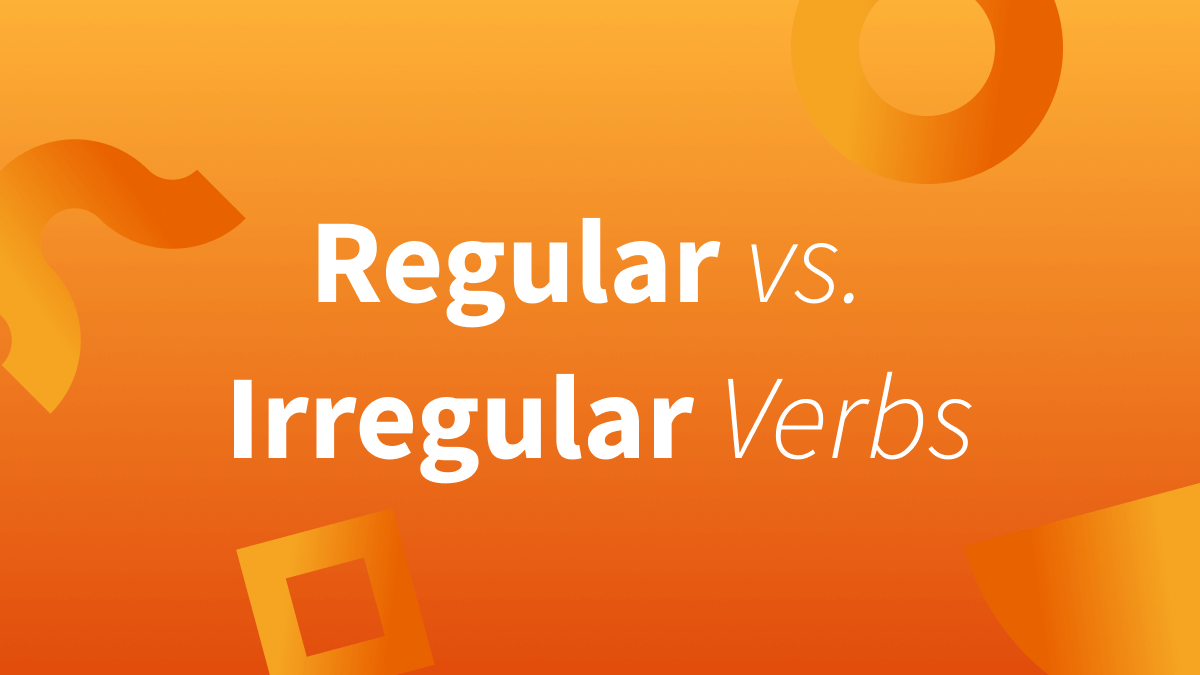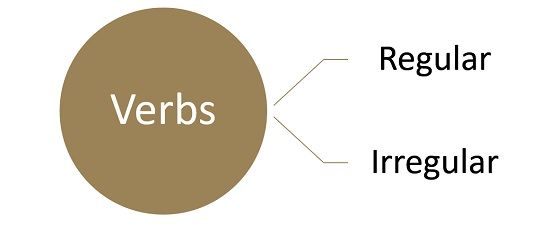1. What Is The Difference Between Regular and Irregular Verbs?
Regular verbs follow typical conjugation patterns (like dance/danced/danced), whereas irregular verbs do not (like drive/drove/driven). It is the simple past ...
What makes a verb “regular” or “irregular”? We’ll go over the distinction and provide examples of both types of verbs.

2. How to Learn Regular and Irregular English Verbs
Oct 17, 2017 · The majority of verbs, called 'Regular verbs', follow the same pattern and create the past simple and the past participle using the same word ...
Do you want to learn English Verbs? Here we explain the differences between regular and irregular English verbs, how to form the verbs, and how to use them.

3. [PDF] Regular and Irregular Verbs - Graduate Writing Lab
There are no differences in form between regular and irregular verbs when using the simple present, present participle, and infinitive.
4. "Regular and Irregular Verbs" in English Grammar | LanGeek
There are approximately 200 irregular verbs in the English language. The irregular verbs are categorized into four groups: Group I: Verbs that have different ...
Based on how we conjugate verbs in the past simple and the past participle, they can be divided into two types: Regular verbs and Irregular verbs.

5. Regular and irregular verbs | English Live Blog
This is a very large group of irregular verbs. Other examples include the following verbs: 'buy or bought', 'feel or 'felt, 'hear or heard', 'keep or kept' ...
Verbs, eh? What would we do without them? Well, not really very much because verbs are the words that describe the actions that we do.

6. Introduction to irregular verbs (video) - Khan Academy
Duration: 3:29Posted: Mar 28, 2016
Learn for free about math, art, computer programming, economics, physics, chemistry, biology, medicine, finance, history, and more. Khan Academy is a nonprofit with the mission of providing a free, world-class education for anyone, anywhere.

7. ANSWER: Verbs with regular and irregular past tense forms
In short, if a verb has both a regular and irregular form, you have the flexibility to use whichever sounds better to you or best conveys the voice you want. !
avidrosette wants to know: When a verb has both an irregular past tense form and a regular one, such as shone/shined or dove/dived, are the words interchangeable or are there rules that govern when each form should be used? Is contemporary English usage leaning more toward the regular forms? With…

8. Regular vs. Irregular Verbs: Let's Talk About the Past - Citation Machine
Mar 5, 2019 · A List of Irregular Verbs ; lose, lost, lost ; ride, rode, ridden ; ring, rang, rung ; rise, rose, risen.
Are you ready to know what irregular verbs and regular verbs do? Without them, communication is possible, yet basic. Read on to find out why!
9. Regular and Irregular verbs | verbs | English Grammar | ENglish EFL
Regular and irregular verbs ... A regular verb is any verb whose conjugation follows the typical pattern, or one of the typical patterns, of the language to which ...
A regular verb is any verb whose conjugation follows the typical pattern, or one of the typical patterns, of the language to which it belongs. A verb whose conjugation follows a different pattern is called an irregular verb.
10. Regular and Irregular Verbs in English, Examples & List - Career Power
In other words, any verb that does not add -ed, '-ied', or -d to its past tense form is considered an irregular verb. Irregular verbs are sometimes also called ...
Here we have discussed about regular and irregular verbs in English, its different forms, examples and a detailed list.
11. Regular and Irregular Verbs | Empire State University
Irregular verbs change into substantially different words as they move from singular to plural or past to present; for example: am/are, has/have and does/do.
Writing Support > Writing Resources > Grammar > Verbs > Regular and Irregular Verbs
12. Difference Between Regular and Irregular Verbs
May 4, 2022 · The basic difference between regular and irregular verbs is that while regular verbs have a consistent or fixed ending, when they are ...
The basic difference between regular and irregular verbs is that while regular verbs have a consistent or fixed ending, when they are changed to past forms. As against, there is no such pattern in the case of irregular verbs, because they either fully change their form or remains unchanged in the past tense.

13. All about Regular and Irregular Verbs | Leverage Edu
Unlike regular verbs, irregular verbs do not follow the normal rules of conjugation to form their past, past participle, or future tense forms. In other words, ...
Know all about using regular and irregular verbs in the English language. Complete list of most commonly used regular and irregular verbs,

14. List of Regular and Irregular Verbs (English Verb Forms) - ESLBUZZ
Irregular verbs are verbs that do not follow the predictable pattern of regular verbs in their conjugation for different tenses. In English, irregular verbs ...
Verb Forms! Verbs are subdivided into two groups, regular verbs and irregular verbs, on the basis of how their past tense and past participles are formed. In this lesson, you will learn list of regular verbs and irregular verbs in English.

15. Regular and Irregular Verbs - The Free Dictionary
Regular verbs form the past simple tense and past participle the same way (-d or -ed), while irregular verbs do not adhere to a distinct or predictable ...
Regular verbs form the past simple tense and past participle the same way (-d or -ed), while irregular verbs do not adhere to a distinct or predictable pattern.

16. Irregular Verbs List - The Complete List - Ginger Software
Irregular Verbs – Complete List ; be, was/were, been ; bear, bore, born(e) ; beat, beat, beaten ; become, became, become.
Improve your English using wisdom of crowds

17. Irregular Verbs - Purdue OWL
In English, regular verbs consist of three main parts: the root form (present), the (simple) past, and the past participle. Regular verbs have an -ed ending ...
18. Regular and Irregular Verb Examples - ESL Kids World
Regular verbs follow simple past and past participle forms. Conversely, irregular verbs have their own set of rules, to create past tense forms. Check out the ...
regular and irregular verb examples, regular and irregular verb rules, regular and irregular verbs in english, what are regular and irregular verbs, regular and irregular verbs in english grammar, regular and irregular verb definition, examples of regular and irregular verbs, regular and irregular verbs, eslkidsworld, esl kids world

19. Grammar. Regular and irregular verbs - Oxford Language Club
An English verb can be regular or irregular. Regular verbs form their past and past participle forms by adding –ed. Examples are given below.
Fast, Effective and innovative method of Learning English
20. Regular and Irregular Verbs - My English Grammar
Irregular verbs, unlike regular verbs, do not follow a standard pattern when changing tense. This means that the past tense and the past participle can be ...
In English grammar, verbs are divided into two main categories - Regular verbs and Irregular verbs. The main difference between these two categories depends
21. Regular Verbs and Irregular Verbs - English Grammar Focus
All verbs in English can be classified as either regular or irregular, depending on how they are conjugated into the past simple and past participle forms.
Looking for a clear explanation to help you with regular verbs and irregular verbs? Find the answer to this question using our online English grammar guide packed with short and simple explanations and examples.
22. Types, Tenses, and Moods, Lesson 7: Irregular Verbs
These verbs also have an irregular past tense and past participle. Regular Present, Irregular Present (third person singular only), Regular Present Participle ...
Learn more about irregular verbs. Our lessons offer detailed explanations along with exercises to test your knowledge.